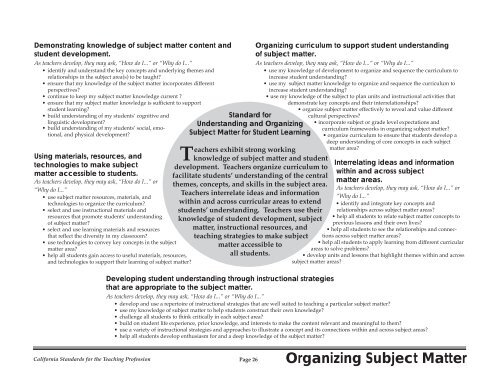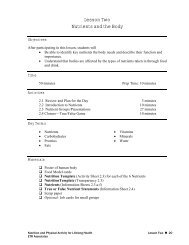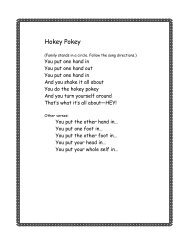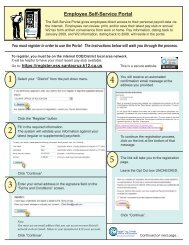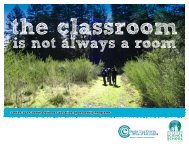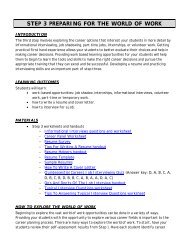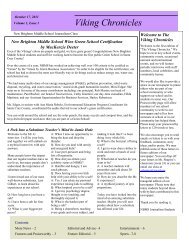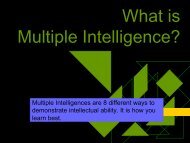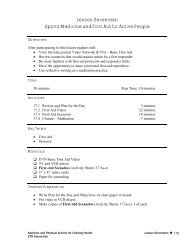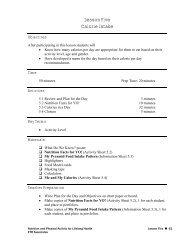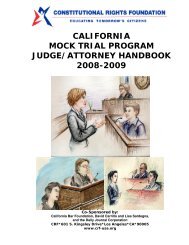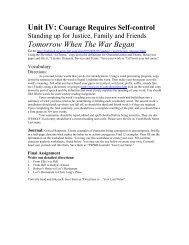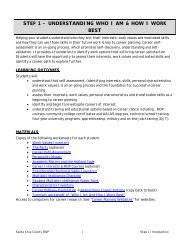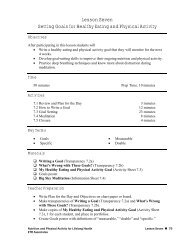California Standards for the Teaching Profession - Commission on ...
California Standards for the Teaching Profession - Commission on ...
California Standards for the Teaching Profession - Commission on ...
Create successful ePaper yourself
Turn your PDF publications into a flip-book with our unique Google optimized e-Paper software.
Dem<strong>on</strong>strating knowledge of subject matter c<strong>on</strong>tent and<br />
student development.<br />
As teachers develop, <str<strong>on</strong>g>the</str<strong>on</strong>g>y may ask, “How do I...” or “Why do I...”<br />
• identify and understand <str<strong>on</strong>g>the</str<strong>on</strong>g> key c<strong>on</strong>cepts and underlying <str<strong>on</strong>g>the</str<strong>on</strong>g>mes and<br />
relati<strong>on</strong>ships in <str<strong>on</strong>g>the</str<strong>on</strong>g> subject area(s) to be taught<br />
• ensure that my knowledge of <str<strong>on</strong>g>the</str<strong>on</strong>g> subject matter incorporates different<br />
perspectives<br />
• c<strong>on</strong>tinue to keep my subject matter knowledge current <br />
• ensure that my subject matter knowledge is sufficient to support<br />
student learning<br />
• build understanding of my students’ cognitive and<br />
linguistic development<br />
• build understanding of my students’ social, emoti<strong>on</strong>al,<br />
and physical development<br />
Using materials, resources, and<br />
technologies to make subject<br />
matter accessible to students.<br />
As teachers develop, <str<strong>on</strong>g>the</str<strong>on</strong>g>y may ask, “How do I...” or<br />
“Why do I...”<br />
• use subject matter resources, materials, and<br />
technologies to organize <str<strong>on</strong>g>the</str<strong>on</strong>g> curriculum<br />
• select and use instructi<strong>on</strong>al materials and<br />
resources that promote students’ understanding<br />
of subject matter<br />
• select and use learning materials and resources<br />
that reflect <str<strong>on</strong>g>the</str<strong>on</strong>g> diversity in my classroom<br />
• use technologies to c<strong>on</strong>vey key c<strong>on</strong>cepts in <str<strong>on</strong>g>the</str<strong>on</strong>g> subject<br />
matter area<br />
• help all students gain access to useful materials, resources,<br />
and technologies to support <str<strong>on</strong>g>the</str<strong>on</strong>g>ir learning of subject matter<br />
Standard <str<strong>on</strong>g>for</str<strong>on</strong>g><br />
Understanding and Organizing<br />
Subject Matter <str<strong>on</strong>g>for</str<strong>on</strong>g> Student Learning<br />
Teachers exhibit str<strong>on</strong>g working<br />
knowledge of subject matter and student<br />
development. Teachers organize curriculum to<br />
facilitate students’ understanding of <str<strong>on</strong>g>the</str<strong>on</strong>g> central<br />
<str<strong>on</strong>g>the</str<strong>on</strong>g>mes, c<strong>on</strong>cepts, and skills in <str<strong>on</strong>g>the</str<strong>on</strong>g> subject area.<br />
Teachers interrelate ideas and in<str<strong>on</strong>g>for</str<strong>on</strong>g>mati<strong>on</strong><br />
within and across curricular areas to extend<br />
students’ understanding. Teachers use <str<strong>on</strong>g>the</str<strong>on</strong>g>ir<br />
knowledge of student development, subject<br />
matter, instructi<strong>on</strong>al resources, and<br />
teaching strategies to make subject<br />
matter accessible to<br />
all students.<br />
Organizing curriculum to support student understanding<br />
of subject matter.<br />
As teachers develop, <str<strong>on</strong>g>the</str<strong>on</strong>g>y may ask, “How do I...” or “Why do I...”<br />
• use my knowledge of development to organize and sequence <str<strong>on</strong>g>the</str<strong>on</strong>g> curriculum to<br />
increase student understanding<br />
• use my subject matter knowledge to organize and sequence <str<strong>on</strong>g>the</str<strong>on</strong>g> curriculum to<br />
increase student understanding<br />
• use my knowledge of <str<strong>on</strong>g>the</str<strong>on</strong>g> subject to plan units and instructi<strong>on</strong>al activities that<br />
dem<strong>on</strong>strate key c<strong>on</strong>cepts and <str<strong>on</strong>g>the</str<strong>on</strong>g>ir interrelati<strong>on</strong>ships<br />
• organize subject matter effectively to reveal and value different<br />
cultural perspectives<br />
• incorporate subject or grade level expectati<strong>on</strong>s and<br />
curriculum frameworks in organizing subject matter<br />
• organize curriculum to ensure that students develop a<br />
deep understanding of core c<strong>on</strong>cepts in each subject<br />
matter area<br />
Interrelating ideas and in<str<strong>on</strong>g>for</str<strong>on</strong>g>mati<strong>on</strong><br />
within and across subject<br />
matter areas.<br />
As teachers develop, <str<strong>on</strong>g>the</str<strong>on</strong>g>y may ask, “How do I...” or<br />
“Why do I...”<br />
• identify and integrate key c<strong>on</strong>cepts and<br />
relati<strong>on</strong>ships across subject matter areas<br />
• help all students to relate subject matter c<strong>on</strong>cepts to<br />
previous less<strong>on</strong>s and <str<strong>on</strong>g>the</str<strong>on</strong>g>ir own lives<br />
• help all students to see <str<strong>on</strong>g>the</str<strong>on</strong>g> relati<strong>on</strong>ships and c<strong>on</strong>necti<strong>on</strong>s<br />
across subject matter areas<br />
• help all students to apply learning from different curricular<br />
areas to solve problems<br />
• develop units and less<strong>on</strong>s that highlight <str<strong>on</strong>g>the</str<strong>on</strong>g>mes within and across<br />
subject matter areas<br />
Developing student understanding through instructi<strong>on</strong>al strategies<br />
that are appropriate to <str<strong>on</strong>g>the</str<strong>on</strong>g> subject matter.<br />
As teachers develop, <str<strong>on</strong>g>the</str<strong>on</strong>g>y may ask, “How do I...” or “Why do I...”<br />
• develop and use a repertoire of instructi<strong>on</strong>al strategies that are well suited to teaching a particular subject matter<br />
• use my knowledge of subject matter to help students c<strong>on</strong>struct <str<strong>on</strong>g>the</str<strong>on</strong>g>ir own knowledge<br />
• challenge all students to think critically in each subject area<br />
• build <strong>on</strong> student life experience, prior knowledge, and interests to make <str<strong>on</strong>g>the</str<strong>on</strong>g> c<strong>on</strong>tent relevant and meaningful to <str<strong>on</strong>g>the</str<strong>on</strong>g>m<br />
• use a variety of instructi<strong>on</strong>al strategies and approaches to illustrate a c<strong>on</strong>cept and its c<strong>on</strong>necti<strong>on</strong>s within and across subject areas<br />
• help all students develop enthusiasm <str<strong>on</strong>g>for</str<strong>on</strong>g> and a deep knowledge of <str<strong>on</strong>g>the</str<strong>on</strong>g> subject matter<br />
<str<strong>on</strong>g>Cali<str<strong>on</strong>g>for</str<strong>on</strong>g>nia</str<strong>on</strong>g> <str<strong>on</strong>g>Standards</str<strong>on</strong>g> <str<strong>on</strong>g>for</str<strong>on</strong>g> <str<strong>on</strong>g>the</str<strong>on</strong>g> <str<strong>on</strong>g>Teaching</str<strong>on</strong>g> <str<strong>on</strong>g>Professi<strong>on</strong></str<strong>on</strong>g><br />
Page 26<br />
Organizing Subject Matter


